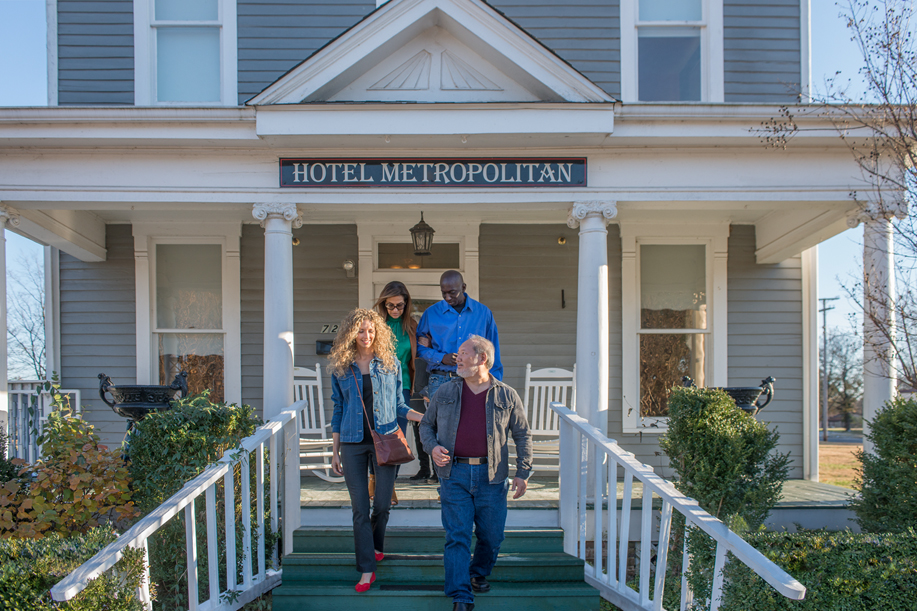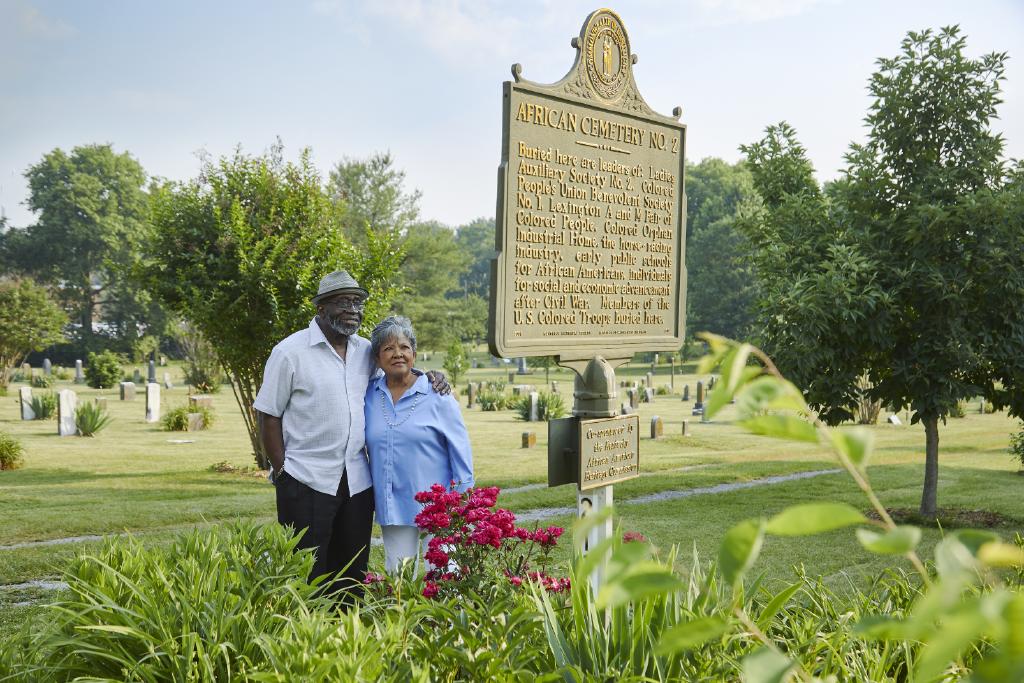Exploring Kentucky's African American History
State Wide
African Americans have made major contributions in every area of the social, educational, civil rights, and other landscapes all over Kentucky. The cities, entities, and organizations in which they lived and worked together form a rich tapestry of history - past and present.
Come along as we traverse the Bluegrass State to reflect, celebrate, and honor those that have come before us, leaving legacies that will last for generations.
Frankfort
Let’s begin our exploration in the state capital – Frankfort.
One of the many historic structures here was built in 1871 - The Frankfort Barracks. They were used by the U.S. military until 1876 to house scores of black soldiers during Reconstruction after the Civil War.
Established in 1865, Green Hill Cemetery is the home of the African American Civil War Memorial. This ten foot-tall monument honors not only the 142 soldiers whose names are inscribed on the stone façade, but the estimated 25,000 who constituted Kentucky's U.S. Colored Troops.
Paducah
About four hours west of Frankfort near the Illinois border in Paducah is the Reverend Martin Luther King, Jr. Memorial. Dedicated in 1983 by the Paducah Branch of the NAACP, it stands in tribute to one of our nation’s most well-known preachers, humanitarians, and icons of the Civil Rights Movement.
During segregation, blacks had to establish their own lodging for travelers who would otherwise have nowhere else to stay. Beginning in the early 1900s and for decades to follow the Hotel Metropolitan welcomed folks like Justice Thurgood Marshall, Duke Ellington and other musicians moving along the South’s "Chitlin' Circuit," members of the Negro Baseball League, and other notable African-American personalities.

The hotel has undergone several iterations and an extensive restoration since it closed as a hotel in the late 1990s. Yet it still contains much of its original elements and character, coupled with the African American history that is still shared here today.
Bowling Green
A little over two hours east of Paducah in Bowling Green, the African American Museum, situated on the Western Kentucky University campus, is a rich collection of exhibits and artifacts highlighting the significant history of the African Americans who lived in this area during the early 20th century.
State Street Baptist Church is home to the oldest African American congregation in the city. Previously named the Baptist Church of Bowling Green and the African Baptist Church, it was originally built in 1873, destroyed by fire, and rebuilt in 1898.
The latter sits in what is called the Shake Rag Historic District, one of two thriving communities established here by former slaves back in the day. Here you can enjoy a walking tour encompassing over a dozen historical markers and structures of African American significance.
Simpsonville
One of Kentucky’s native sons is honored at the Whitney M. Young Birthplace. The site is unique in that it encompasses two different entities, both located on what was originally the Lincoln Institute but now called the Whitney M. Young, Jr. Job Corps Center.
.jpg?sfvrsn=9f0bbcde_1)
The Lincoln Institute Alumni Center was founded as a prominent boarding school for African American high school students, and it was here that Young graduated in 1937 as valedictorian (his father also spent nearly 50 years here as a student and in leadership roles). The Interpretative Center is the two-story birthplace where he lived until age 15, the exhibits inside educating visitors about his early childhood, career, and rise to prominence in the Civil Rights Movement.
Lexington
Encompassing over 5,000 graves, African Cemetery #2 holds great significance in relation to the African American legacy in Lexington and further afield. Many of the Civil War’s U.S. Colored Troops, educators from the former 4th Street Colored School, veterans of World War I and II, individuals who worked in the state’s thoroughbred horse racing industry, and others are remembered here.

The cemetery also offers two themed self-guided walking tours: “African Americans in the Military Civil War to WWII” and “African Americans in the Horse Industry.”
To learn more about the many important places, events, and people that played significant roles in the move towards equality in the city, follow along the African American Heritage Interpretive Sign Program. Female-led lunch counter sit-ins, black private schools, and prominent community leaders are just beginning of the stories shared here.
Danville
Situated right in the center of the state about an hour southwest of Lexington you’ll find the city of Danville. Here you can embark upon the African American Driving Tour. This self-guided tour highlights numerous historic sites and attractions relevant to the black experience throughout the surrounding Danville-Boyle County.
For example, Foag’s Park Baseball Field was a gathering place where blacks enjoyed a range of activities including picnics, ball games, and festivals, while the Shelby City African American Cemetery served as the final resting place of nearly 200 slaves that served nearby families. And the Willis Russell House (sometimes referred to as the Willis Russell Memorial Cabin) was named after a freed black man and the city’s first African American teacher.
Bloomfield
Located in Bloomfield, just shy of an hour southeast of Louisville, the lovingly restored Ham Brown Log Cabin is one example of the types of cabins in which the enslaved lived on Kentucky plantations.
It was originally built as slave quarters somewhere around 1850 and its namesake, a free man of color, was able to purchase it in 1866. He is believed to have resided here with nine other people, most of whom were his immediate family members. The cabin has a long history, as it remained in the family for over seven decades after his death in 1906.
Louisville
Carnegie libraries can be found all over the country and in Louisville, there are nine that are a part of the Louisville Free Public Library. Among them is The Western Library. It is significant in that it was the first public library in the country full operated by African Americans, for African Americans. It is also home to the Louisville Western Branch Library African American Archives, covering a wide swath of black history in the Bluegrass State and beyond.
Another great way to explore Louisville’s rich black heritage is via The Unfiltered Truth Collection. Encompassing eight unique themes, the collection offers a “deep dive” into the unique stories and perspectives of remarkable African Americans—past and present—who are inextricably woven into the fabric of today’s black Louisville experience.